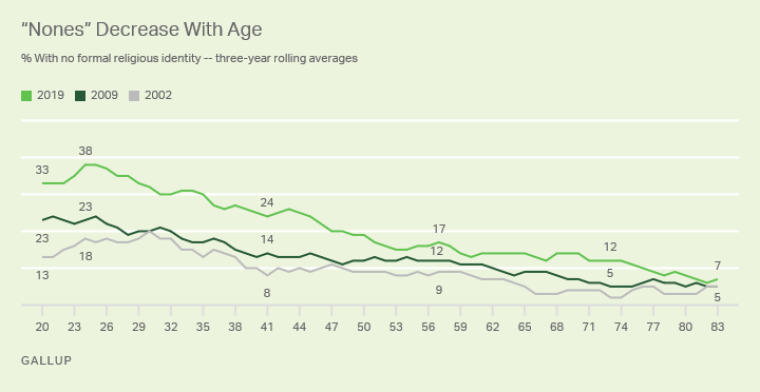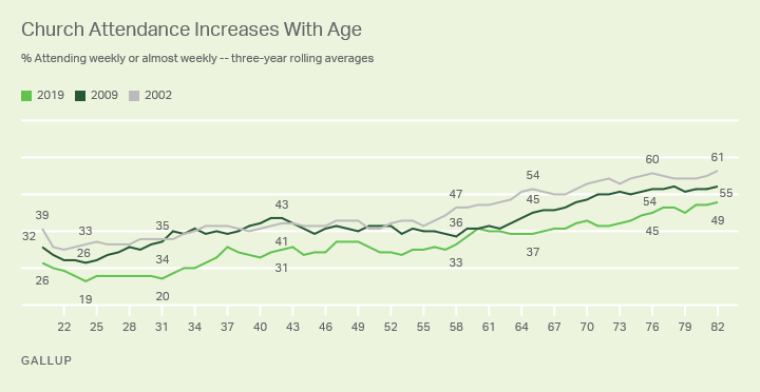 Gallup
GallupPosted on 11/05/2019 9:36:36 AM PST by SeekAndFind
"The rise of the nones" is the attention-grabbing phrase used to describe the well-documented increase in the percentage of Americans who, when queried by survey researchers about their religious identification, say "none." This remarkable social trend has received significant publicity in recent years, based on generally similar research produced by Gallup, Pew Research Center, NORC's General Social Survey and others.
The research shows that between about 20% and 25% of U.S. adults are now "nones" and — in a finding emphasized in many news reports — that this percentage is higher among younger adults than those who are older. One opinion columnist's recent article in The Washington Post, to which I will return below, is titled "Why Millennials Are Skipping Church and Not Going Back."
This type of speculation about the future religiosity of millennials bears further scrutiny. I think the picture is complex, but there are signs that older millennials may in fact, contrary to the headline, be going back to religion.
The basic sociological structure of religiosity by age is well-established and has been evident for decades. It's a firmly set "generational" pattern — that is, one that occurs to every generation of individuals across time, not just a particular cohort. Generational changes in religiosity — like gray hair and the need for bifocals — happen consistently to every generation as they age and are not specific to a particular time period or cohort. Religiosity plummets after age 18, coincident with young people leaving home and heading out into the real world of work or college. Then, religiosity begins to rise again as young people go through their 30s, coincident with marriage, children and more stable involvement in specific communities. Religiosity generally continues to rise with age, albeit with some points at which it is fairly flat and reaches its peak in Americans' late 70s and 80s.
Thus, the general finding in recent data that millennials are less religious than those who are older is expected (millennials are generally defined as those who were born between 1981 and 1996, and thus roughly 23 to 38 years of age in 2019). The surprise would be if this weren't the case.
A second factor providing the context in which the generational pattern plays out is the overall religiosity of the population. Here, recent research shows a definite change. As I noted previously, "nones" are up across the board. And, importantly, the rise of the nones over time seems more apparent among young people than old people.
Most of the recent reports on changes in religiosity lump generations together — looking at trends among millennials, Gen Xers, baby boomers, and seniors aged 72 and older. But millennials represent over 80 million people in the U.S. and span a 15-year age gap. Let's look more closely at what we see within the millennial group.
I've reviewed the data from our combined Gallup surveys from three points in time: 2002, 2009 and 2019 (through mid-October). Since I want to look at more granular age points, I computed rolling three-year averages that reduce variation and increase the stability of the estimates. Gallup
Gallup
The accompanying graph presents data for all adults, 18 to 83, to provide the big-picture context; I'll focus on millennials below. The graph illustrates the relationship between age and religion at the three points in time (each line represents data from one of the three years in the analysis). Each point on the bottom axis represents the age of the person interviewed (more precisely, a rolling average computed from the responses of those in the three years ending in each year).
Several things are evident. There are clearly more "nones" of all ages now than there were in 2002 and 2009, and particularly more nones now among younger people. This is the rise of the nones we hear so much about, and it's a rise of the nones that is most evident among those who are younger.
But, despite this overall increase of nones, older people are still less likely to eschew religion than those who are younger. And, the pattern of nones among those of millennial age today follows the same generational pattern evident in 2002 and 2009. People in their 20s are less religious than people in their early 30s.
In other words, millennials as a group are less religious than they used to be, but they are not a homogenous group. Older millennials are more likely to be religious than younger millennials are. This pattern across ages is as evident now as was the case for the same age range in the recent past.
I also looked at another indicator, self-reported church attendance. As expected, the overall level of church attendance this year is lower than in 2002 and in 2009, generally across the age spectrum. (The interesting exception is among those in their late 50s and early 60s, among whom church attendance was the same in 2009 as it is this year.) Gallup
Gallup
But the generational pattern by which religious service attendance begins to climb with age is generally evident among those interviewed in each of the three years, although the rise with age is somewhat delayed in 2019 compared with the two previous points in time. We saw higher church attendance among those in their mid- to late twenties in 2002 and 2009. This year, heightened attendance is delayed until it begins to be evident among those in their 30s. But, and this is the key point, church attendance among millennials does begin to get higher with age as millennials reach their early 30s.
The headline in The Washington Post piece to the effect that millennials are "not going back" to church doesn't appear to be a wholly accurate depiction of what is happening. The oldest millennials are going back to church, just as people their age (and younger) went back to church in 2002 and 2009. The absolute level of self-reported church attendance is lower at each age point now than in the past, but the trajectory of attendance is following the same pattern.
There are a number of structural factors at work reshaping today's religious landscape. Americans as a whole are less likely to say they have a formal religious identity, and less likely to report being frequent church attenders. These trends are more evident among millennials than among those who are older. But the generational patterns by which people return to religion as they age still appear to be evident. Older millennials are more likely than younger millennials to have a religious identity, and older millennials are more likely than younger millennials to say they attend religious services frequently.
There are fascinating explanations, theories and hypotheses for these trends — why we continue to see predictable variations in religiosity across the age spectrum, decade after decade, and why we see an overall rise in the nones and changes in other measures of religiosity. We can save these for future discussion.
We'll need to continue to study available data in the years to come to see if the patterns evident among older millennials today continue as younger millennials age into their 30s (and as Generation Z ages into that age range behind them). But what we see now suggests that predictions of the forthcoming demise of religion as we know it may be premature. Broad structural changes in society and culture may well continue to affect religiosity across all groups, but the big bulge of millennials may actually get more religious as they age.
Would like to see the bottom chart based on polling compared to actual attendance records from churches.
It might show much of a bias people have in refusing to share their information with the pollers.
You could only get moronials to church if you had it after 2pm, replaced the pews with couches, replaced the wine with organic kale juice, the wafer with THC gummy bears, and burned pot instead of frankincense
There also seems to be just a delay in resuming the trend - which may be part of the delay in growing up we’ve seen in other areas.
Basically, what’s happening is the mainline denominations are dying because they were taken over by homosexuals and everyone left.
This^^^
Ok Boomer.
“Ok Boomer.”
Wrong! 1967 - GenX
Disclaimer: Opinions posted on Free Republic are those of the individual posters and do not necessarily represent the opinion of Free Republic or its management. All materials posted herein are protected by copyright law and the exemption for fair use of copyrighted works.